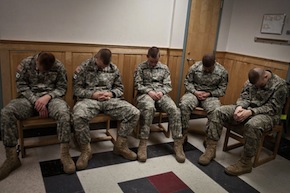The U.S. Dept. of Defense has given a $2.4 million grant to study Transcendental Meditation and PTSD. Here is a great Boston Globe article.
MUM Research Institute is studying the effect of TM on post traumatic stress disorder (PTSD) in army types with the San Diego Veterans Administration Medical Center.
It is a clinical trial where subjects are assigned at random to test and control conditions. The Transcendental Meditation programme is being compared with a well-tested existing therapy. A third group will receive health education. The study will follow 210 subjects for 4 years. This is almost as long as the amazing heart disease study which took 14 years to complete.
This type of study yields results which science views as reliable. It is similar in many ways to drug research which the world regards as the holy grail.
This novel training will determine whether regular brief periods of meditation can improve troops’ performance. Ultimately, we hope the transcendental meditation might be made available across all branches of the military. It would to help inoculate troops against acute post-traumatic stress disorder. PTSD has reached epidemic proportions and is blamed for a record number of suicides in the ranks.
Meditation training is a radical approach for an army that demands incoming cadets exhibit physical and mental toughness. Military culture has long associated meditation with a leftist, antiwar philosophy, according to the Boston Globe.
But TM instructor David Zobeck says: “It’s like putting on a flak jacket against stress,” he added. “The things that used to almost kill you in the stress department have less power. For a soldier this is money in the bank.”
Preliminary results of the study, now in its second year, have surprised even its lead researchers. Levels of stress, anxiety, and depression have decreased significantly, according to Boston Globe information.
And the trial group recently outperformed the 17 other Rook platoons in a tiring competition needing mental and physical resilience.
We’d love you to share this article with friends – specially those in trauma counselling. Copy and email it, or use the buttons below.


